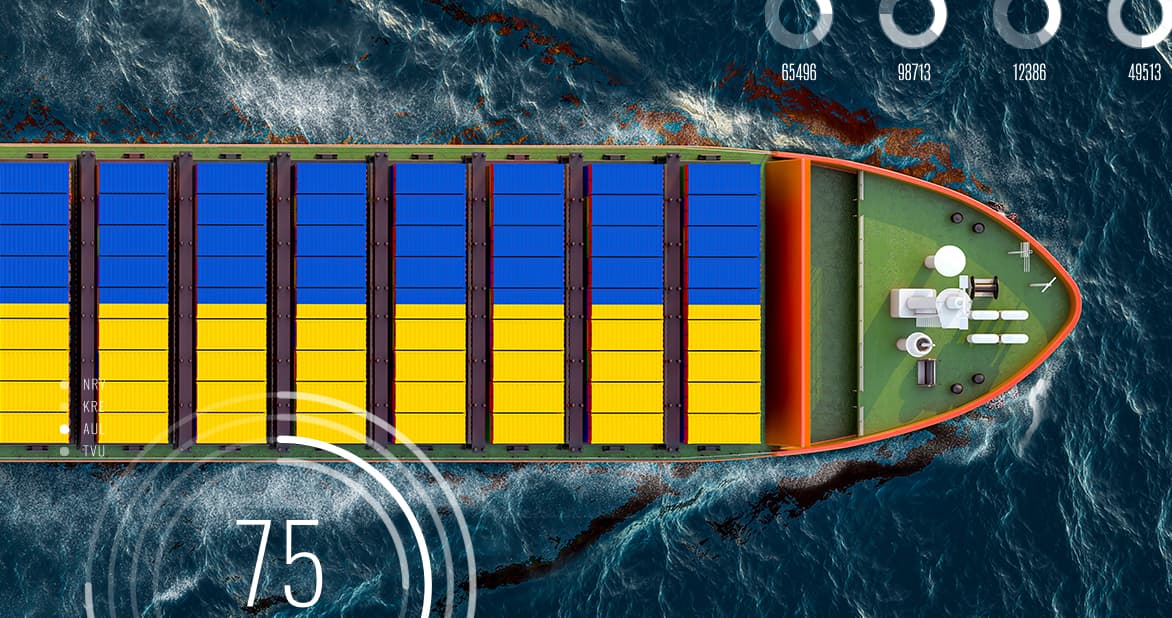War in Ukraine & Its Impact on the Global Supply Chain Crisis

Over the past couple of years, we’ve seen global supply chains pushed to the brink of speed and capacity. Global providers, ports and intermediaries of all sizes have struggled to keep up with shipping capacity demand as COVID-19 and the ongoing labor shortages continue to impact networks. The volume – more than 30% of pre-covid in some places – have exposed the lack of network resilience and overwhelmed transportation networks globally. Unfortunately, the war in Ukraine puts additional pressure on networks for a variety of reasons:
- Russian owned capacity taken offline due to sanctions
- Route disruptions to avoid risky areas
- Re-alignment of global supply chains to make up for the loss of goods provided by Ukraine
If the war escalates, these pressures will continue to make things more difficult. We’ve already seen some rapid and dramatic effects of the war reflected in current global crude prices and US gas prices, but that’s just one example of how this war will impact economies and industries worldwide.
In this article, we’re looking at the current situation around Ukrainian and Russian exports and how this conflict could impact US businesses.
Ukrainian Exports
Ukraine is a sovereign state in Eastern Europe that currently exports approximately USD 49.4 billion worth of goods around the globe annually. Traditionally, Ukraine’s most important trade partner had been Russia. In recent years, Ukraine has diversified its global partners to include many of the world’s largest organizations all over the world in 2019, the US alone imported USD 1.3 billion worth of goods from Ukraine. The country’s critical exports include:
Raw Materials
- Iron
- Steel
- Mining products
Grains
- Barley
- Corn
- Wheat
Electronics Manufacturing
- Neon gas
Due to the war, Ukrainian mines have shut down, materials processing has ceased, and most exports have been halted until peace is returned to the country. As spring returns a new growing season, displaced farmers will begin missing seasons to plant and harvest, resulting in a massive loss of food products. Beyond corn and wheat, however, is the critical production of neon gas. Currently, Ukraine produces approximately 50% of the world’s neon for use in microchips. The chip shortage has already been a challenge for manufacturers of all types of electronics and all modern automobiles. In Germany, for example, many automotive plants have already ceased production due to the extreme lack of chip availability, leading to fewer new and used cars on the market overall and adding fuel to the already severe increases in pricing for those vehicles.
Russian Exports
In all its geo-political forms, Russia has always been a major supplier on the world’s stage and, since the 90s, has built a large economy that integrates with all types of businesses and governments. Russia’s most significant exports include:
Energy
- Crude petroleum
- Refined petroleum
- Coal
- Natural gas
Rare metals and minerals
- Gold
- Metal oxides
- Tantalum
- Niobium
Grains
- Barley
- Corn
- Wheat
Currently, Russia is the third-largest oil supplier behind the US and Saudi Arabia. However, unprecedented sanctions against the country for their government’s war against Ukraine have crippled The Russian economy and making it nearly impossible to trade with most of the businesses they’ve partnered with over the past decades.
Impact on a Global Scale
Shipping from both Ukraine and Russia to any global partners, let alone the US, is currently strictly limited as both countries commit supply chain resources and even civilian modes of transportation to their respective war efforts. Even if some manufacturers and processing plants were able to operate, or farmers could produce a harvest, there’s no reliable way to export those goods on a large scale at this time.
Shipping in and out of Odesa has ceased almost entirely, and Turkey has limited shipping through Istanbul, blocking sea freight between the Black Sea and the Mediterranean. Europe-to-China rail transportation has stopped, and most cargo is forced onto longer, more expensive routes by sea. Major US shipping companies like UPS and FedEx have also announced a suspension of all shipping services to and from Ukraine until the fighting has ceased.
How these Supply Chain Issues Impact US Businesses
A recent Forbes report states that 374,000 businesses worldwide rely on Russia for imports – with 90% of those businesses located in the US. Due to sanctions and overwhelming consumer pressure to halt any Russian business presence, transportation costs will only continue to rise. Sea, rail, and air freight will likely see bidding wars for available capacity that cause price spikes for countless goods and materials. Volatile pricing can spur irrational buying habits, further exacerbating the situation as consumers either overbuy or stop buying altogether.
How You Can Navigate these Supply Chain Challenges
There’s no way around it – the crisis in Ukraine is impacting shipping on a global scale and will cause ripple effects for years to come. As global supply chains continue to adapt to the post Covid world, transportation resilience will be increasingly rewarded. Shippers are well advised to plan for long lead times, develop alternative sources, and develop a dependable relationship with a logistics partner on the inside. An industry leader in the chemical transportation industry, CLX Logistics is a reliable source of end-to-end, bespoke logistics management solutions. Capacity management, freight brokerage, intermodal solutions, rail tracking and management, and more ensure your organization has the necessary chemical transportation resources to serve your customers quickly and effectively.
As the conflict in Ukraine continues, take appropriate steps to protect yourself from volatility and uncertainty with a complete range of cost-effective, best-in-class solutions for every aspect of your transportation network. Contact us today to discuss your current supply chain situation and see how CLX can help.
Back to Resources
